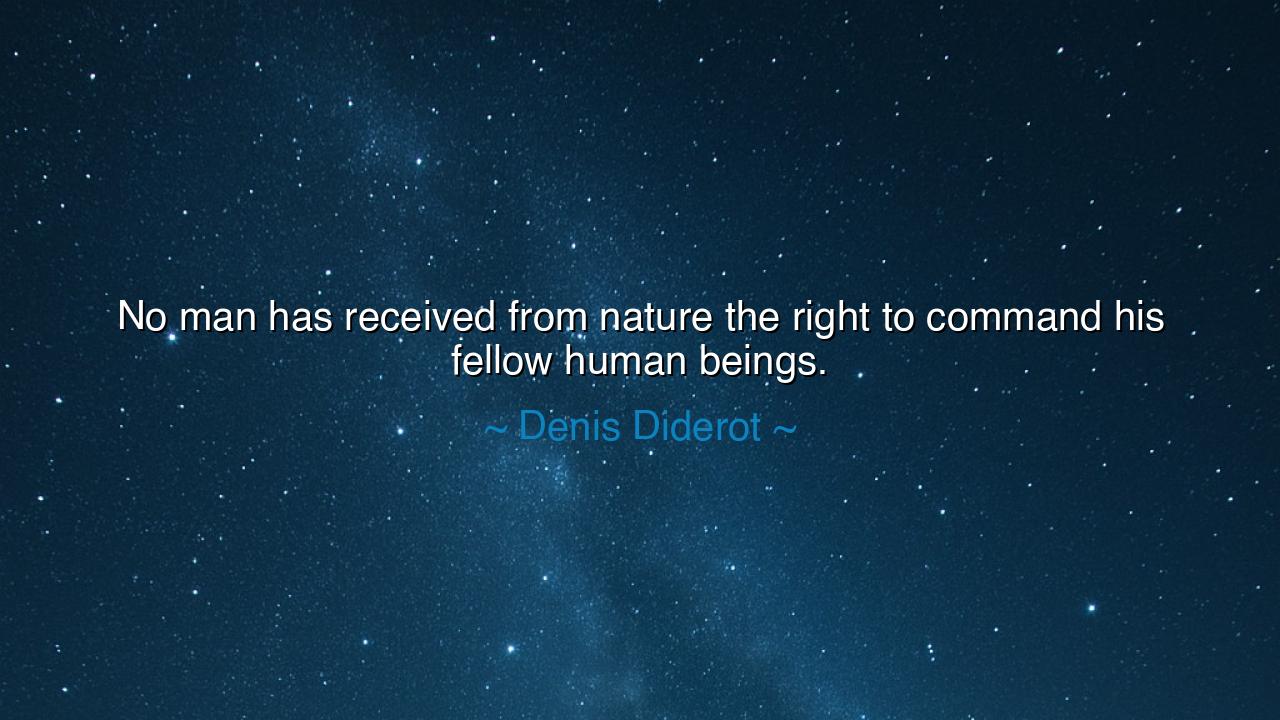
No man has received from nature the right to command his fellow






When Denis Diderot declared, “No man has received from nature the right to command his fellow human beings,” he spoke with the fiery clarity of the Enlightenment, striking at the chains of tyranny and the arrogance of kings. His words were not the idle musings of a philosopher; they were a cry against the long centuries when men believed authority was bestowed by heaven upon a chosen few, while the rest were condemned to obedience. Diderot, who labored on the great Encyclopédie to spread knowledge and reason, saw that nature gives to all men the same breath, the same hunger, the same fragility of life. If all share these things, who then can claim dominion by natural right?
The origin of such a declaration lies in the struggle of Diderot’s age, the 18th century, when the divine right of kings was preached as eternal law. Monarchs claimed they ruled by the decree of God; nobles claimed superiority by blood. Yet the philosophers of the Enlightenment, Diderot among them, shattered these illusions. They proclaimed that authority is not granted by nature, but must be justified by consent, by justice, and by the common good. To command without such justification is not law—it is tyranny.
History provides us many examples of this truth. Consider the American Revolution, when colonists, once subjects of a distant king, declared that all men are created equal and endowed with unalienable rights. They rejected the notion that George III possessed some natural right to command them. Likewise, the French Revolution, born in part from the very philosophy Diderot and his peers advanced, tore down the ancient walls of monarchy, crying out that sovereignty belongs to the people, not to the accident of a king’s birth. These events prove the power of Diderot’s words: that when people awaken to the falsehood of “natural” authority, the world itself begins to change.
The ancients, too, glimpsed this truth. Cicero wrote that true law is right reason in agreement with nature, universal and unchanging, binding all men equally. And even in the Bible we read that God “is no respecter of persons.” Though ages of rulers twisted words to justify their power, the whisper of equality never died. Diderot gave it voice anew, sharp and unmistakable: no crown, no title, no sword makes a man innately superior to another.
The meaning of Diderot’s statement is therefore both liberating and humbling. Liberating, because it proclaims that no one is born a slave, and no one a master by divine decree. Humbling, because it reminds us that authority, when it exists, must be earned through service, consent, and justice, not seized as a privilege. The general who forgets this becomes a tyrant; the ruler who forgets this becomes a despot. But the leader who remembers it governs not as master, but as servant of the people.
The lesson for us is clear: wherever you walk, respect the dignity of your fellow human beings. Do not imagine that your wealth, your status, or your position gives you the natural right to command another. Authority must be rooted in mutual respect, and power must always bow before justice. If you lead, do so by inspiration and service, not by force and pride. If you follow, do so not with blind obedience, but with discernment, giving your loyalty only where it is deserved.
Practically, let us live this truth by challenging every unjust hierarchy that cloaks itself in the language of inevitability. Speak against prejudice, against systems that claim some men are “naturally” superior to others by birth, gender, or class. Teach the young that dignity belongs to all. And in our daily lives, let us embody equality by treating every person we meet, from the lowliest to the highest, as a fellow traveler, equal in the eyes of nature.
Thus, Diderot’s words endure like a trumpet across the ages: no man is born master, no man is born slave. The right to command is not carved into our nature, but must be granted by the just order of society, by the consent of the governed, and by the principles of reason and fairness. To forget this is to return to chains; to remember it is to walk in freedom.






AAdministratorAdministrator
Welcome, honored guests. Please leave a comment, we will respond soon